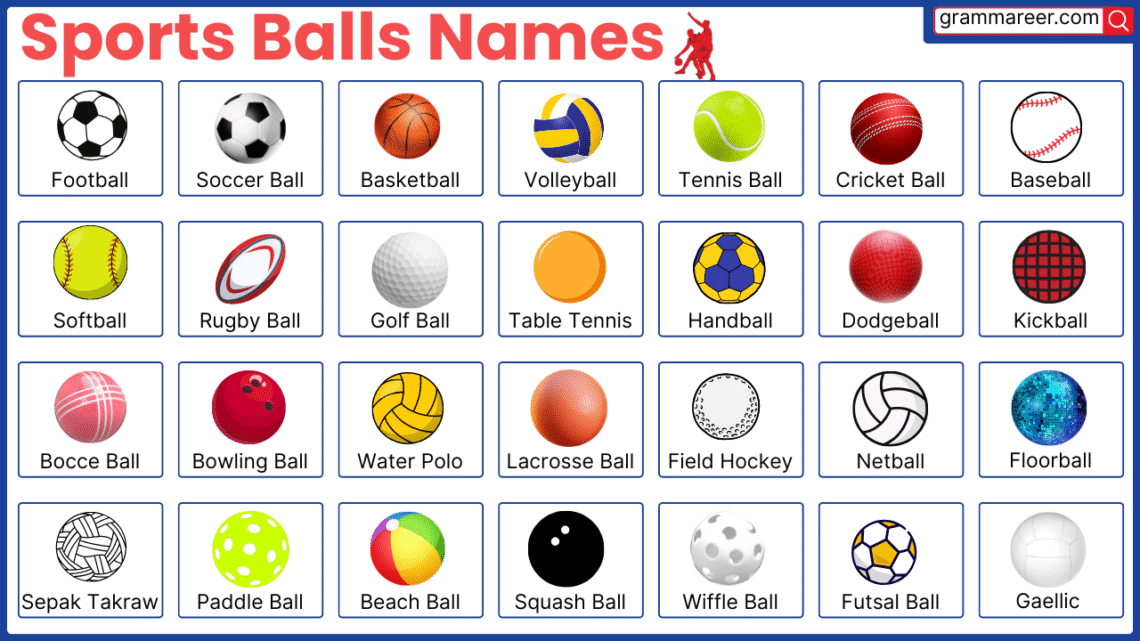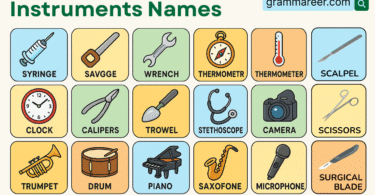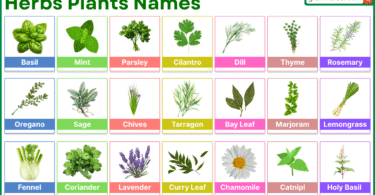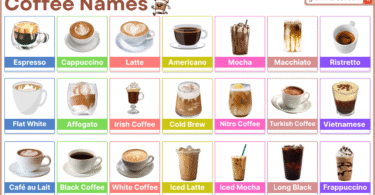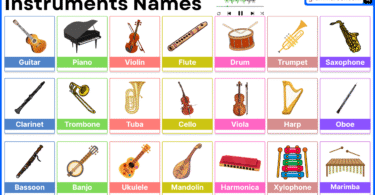Knowing the sports balls names is useful for both sports fans and English learners working on their sports equipment vocabulary. In this post, you’ll find a sports balls list with 50 ball names from popular games like football, tennis, basketball, and cricket. Each ball comes with its picture to help you learn visually and remember how it’s used in the sport. The list includes both indoor and outdoor sports ball names, organized by sport for easier learning and quick reference.
Table of Contents
50 Sports Balls Names with Pictures
- Soccer Ball
- Basketball
- Volleyball
- Tennis Ball
- Cricket Ball
- Baseball
- Softball
- Rugby Ball
- American Football
- Golf Ball
- Table Tennis Ball
- Squash Ball
- Handball
- Water Polo Ball
- Netball
- Sepak Takraw Ball
- Bowling Ball
- Bocce Ball
- Lacrosse Ball
- Floorball
- Arena Football Ball
- Gaelic Football Ball
- Aussie Rules Football Ball
- Beach Ball
- Dodgeball
- Paddle Ball
- Wiffle Ball
- Kickball
- Croquet Ball
- Polo Ball
- Quidditch Ball
- Bubble Soccer Ball
- Zorb Ball
- Kin-Ball
- Bossaball Ball
- Hooverball
- Medicine Ball
- Reaction Ball
- Agility Ball
- Skittles Ball
- Gymnastics Ball
- Footvolley Ball
- Frisbee
- Basque Pelota Ball
- Jai Alai Ball
- Tetherball
- Slamball
- Underwater Rugby Ball
- Field Hockey Ball
- Makruk Ball
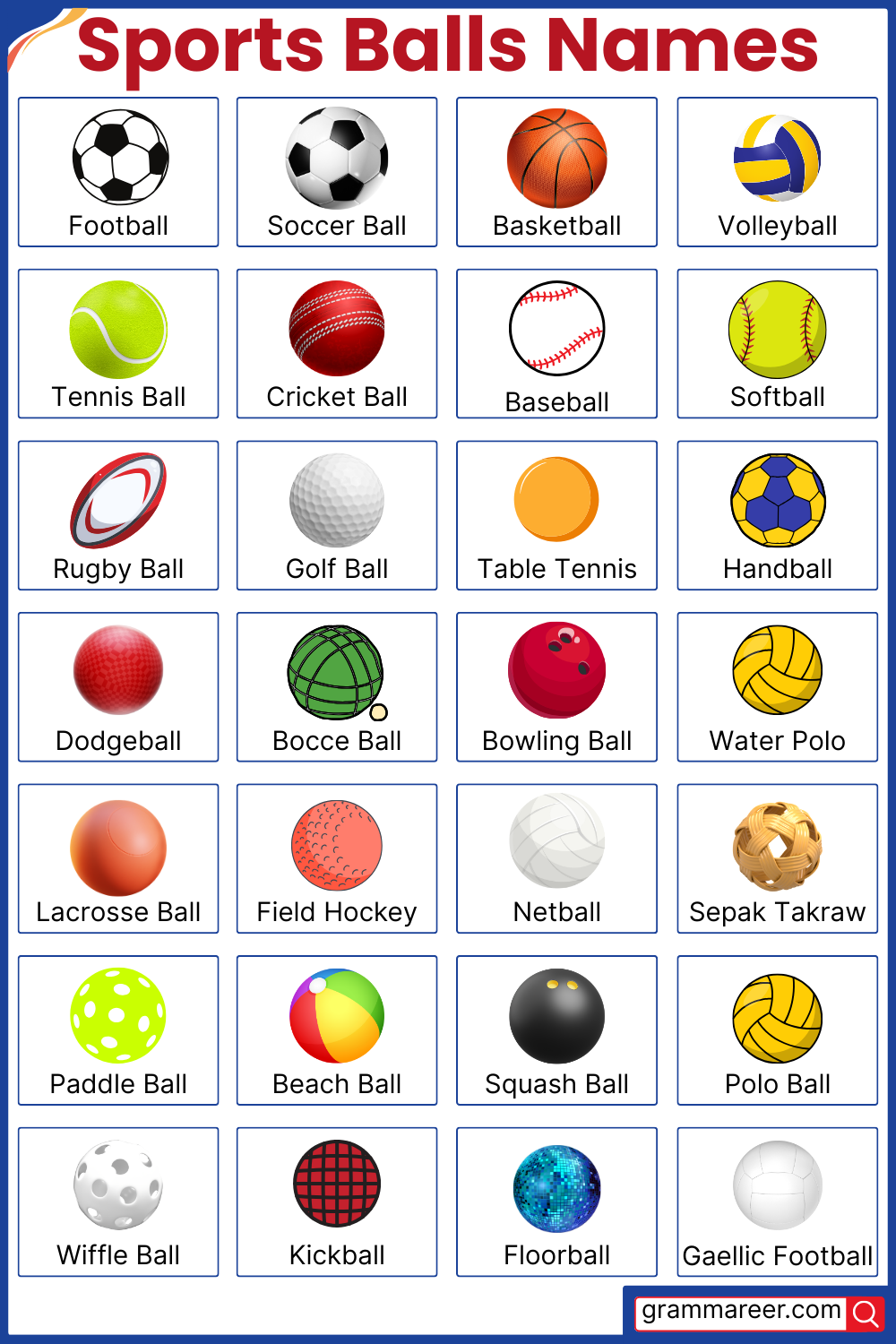
More about Different Types of Sports Balls
1. Soccer Ball
A soccer ball is the most iconic sports ball, used in the game of soccer (or football). It is designed to be kicked, dribbled, and passed. The ball’s size and shape make it ideal for accurate kicks and control in the game.
Key Features:
- Material: Leather or synthetic
- Size: Around 22-23 cm in diameter
- Weight: 410-450 grams
2. Basketball
A basketball is used in the sport of basketball. It is larger than a soccer ball and has a unique texture that helps with grip. The ball is designed to be dribbled and shot with precision.
Key Features:
- Material: Synthetic rubber or leather
- Size: Around 24 cm in diameter
- Weight: 600-650 grams
3. Volleyball
A volleyball is used in volleyball games and is designed to be lightweight and easy to handle. Its smooth, textured surface ensures players can pass, serve, and spike effectively.
Key Features:
- Material: Synthetic leather or rubber
- Size: 21-22 cm in diameter
- Weight: 260-280 grams
4. Tennis Ball
A tennis ball is small and covered in felt, used in the sport of tennis. Its bounce is controlled for rallies, and its bright yellow color makes it easy to track during matches.
Key Features:
- Material: Felt and rubber
- Size: Around 6.7 cm in diameter
- Weight: 56.7 grams
5. Cricket Ball
A cricket ball is made of hard leather with a solid core and is used in cricket matches. Its design allows for high-speed deliveries and a stable bounce on different pitch types.
Key Features:
- Material: Leather
- Size: 22.4-22.9 cm in circumference
- Weight: 155.9-163 grams
6. Baseball
A baseball is a hard leather ball used in the sport of baseball. It is tightly wound with a rubber or cork core and is built for high-speed hits and throws.
Key Features:
- Material: Leather with rubber or cork core
- Size: 23 cm in circumference
- Weight: 145-150 grams
7. Softball
A softball is similar to a baseball but larger and softer. It’s designed for the game of softball, allowing for easier handling and pitching at slower speeds.
Key Features:
- Material: Leather with rubber or polyurethane core
- Size: 30.5 cm in circumference
- Weight: 180-200 grams
8. Rugby Ball
A rugby ball is oval-shaped to accommodate the specific needs of rugby. Its shape helps with passes, kicks, and handling, providing better control for players.
Key Features:
- Material: Synthetic leather or rubber
- Size: Around 28-30 cm in length
- Weight: 410-460 grams
9. American Football
An American football is an elongated ball used in the sport of American football. Its shape allows it to spiral during passes, making it easier for players to handle and throw.
Key Features:
- Material: Leather or synthetic
- Size: 28 cm in length
- Weight: 410-450 grams
10. Golf Ball
A golf ball is small and dimpled to reduce air resistance and allow for longer flight distances. It’s designed to be hit with precision using a club.
Key Features:
- Material: Rubber core with synthetic cover
- Size: 4.27 cm in diameter
- Weight: 45.93 grams
11. Table Tennis Ball
A table tennis ball is a small, lightweight ball used in the fast-paced game of table tennis. It’s made of plastic and designed for high-speed rallies.
Key Features:
- Material: Plastic
- Size: 3.8 cm in diameter
- Weight: 2.7 grams
12. Squash Ball
A squash ball is smaller than most other balls and is designed for the indoor sport of squash. It is highly elastic to ensure rapid rebounds during the game.
Key Features:
- Material: Rubber
- Size: 4 cm in diameter
- Weight: 23 grams
13. Handball
A handball is used in the sport of handball, and it is slightly smaller than a soccer ball. It’s designed for players to handle, pass, and shoot using their hands.
Key Features:
- Material: Leather or synthetic
- Size: 18-20 cm in circumference
- Weight: 400-500 grams
14. Water Polo Ball
A water polo ball is used in water polo, where players pass and shoot the ball in the water. It is waterproof and designed with a textured surface for grip.
Key Features:
- Material: Synthetic rubber
- Size: 22-23 cm in diameter
- Weight: 400-450 grams
15. Netball
A netball is used in netball, a sport similar to basketball but without dribbling. The ball is designed for easy passing and shooting.
Key Features:
- Material: Rubber or synthetic
- Size: 24 cm in diameter
- Weight: 400 grams
16. Sepak Takraw Ball
A Sepak Takraw ball is used in the sport of Sepak Takraw, which combines soccer and volleyball. The ball is lightweight and made from rattan or synthetic materials to withstand heavy kicks and volleys.
Key Features:
- Material: Rattan or synthetic
- Size: Around 20 cm in diameter
- Weight: 150-200 grams
17. Bowling Ball
A bowling ball is heavy and designed for rolling down a lane to knock down pins in bowling. It has three finger holes for gripping and control.
Key Features:
- Material: Urethane, plastic, or reactive resin
- Size: 21-22 cm in diameter
- Weight: 6-16 pounds (2.7-7.2 kg)
18. Bocce Ball
A bocce ball is used in the sport of bocce, a popular outdoor game. The ball is larger than a tennis ball, and it’s made to roll smoothly on grass or sand.
Key Features:
- Material: Resin or wood
- Size: 10-12 cm in diameter
- Weight: 900-1300 grams
19. Lacrosse Ball
A lacrosse ball is used in the sport of lacrosse. It’s made from rubber, providing the right balance of firmness and grip for players to catch, pass, and shoot.
Key Features:
- Material: Rubber
- Size: 7.5 cm in diameter
- Weight: 140-150 grams
20. Floorball
A floorball is a lightweight ball used in floorball, an indoor sport similar to hockey. It has holes to reduce air resistance and ensure smooth rolling.
Key Features:
- Material: Plastic
- Size: 7 cm in diameter
- Weight: 23-25 grams
21. Arena Football Ball
An arena football ball is used in indoor arena football, a variation of American football. It’s smaller and slightly heavier than a standard American football to suit the fast-paced indoor environment.
Key Features:
- Material: Leather or synthetic
- Size: 27 cm in length
- Weight: 430-480 grams
22. Gaelic Football Ball
A Gaelic football ball is used in Gaelic football, a sport combining soccer and rugby. It’s spherical like a soccer ball but slightly larger and heavier for handling with the hands.
Key Features:
- Material: Synthetic leather
- Size: 23 cm in diameter
- Weight: 425-475 grams
23. Aussie Rules Football Ball
An Aussie Rules football ball is used in Australian Rules Football. It’s oval-shaped to suit the unique playing style of the game, which involves running, kicking, and marking.
Key Features:
- Material: Leather
- Size: 29-30 cm in length
- Weight: 450-500 grams
24. Beach Ball
A beach ball is a lightweight, inflatable ball used for casual beach or pool games. It’s large, colorful, and easy to hit with the hands.
Key Features:
- Material: PVC or rubber
- Size: 50-60 cm in diameter
- Weight: 100-150 grams
25. Dodgeball
A dodgeball is used in the game of dodgeball. It’s soft yet durable, allowing for both throws and catches without causing injury.
Key Features:
- Material: Rubber or foam
- Size: 22-23 cm in diameter
- Weight: 170-200 grams
26. Paddle Ball
A paddle ball is used in the sport of paddleball, typically played with paddles and a small ball. It is lightweight and made to bounce easily off paddles.
Key Features:
- Material: Rubber or foam
- Size: 7 cm in diameter
- Weight: 25-35 grams
27. Wiffle Ball
A wiffle ball is a lightweight plastic ball with holes in it, making it easier to hit curves and change pitches in wiffle ball games.
Key Features:
- Material: Plastic
- Size: 10 cm in diameter
- Weight: 20-30 grams
28. Kickball
A kickball is used in games similar to baseball but with more emphasis on kicking. The ball is soft and large, making it easy for children and beginners to handle.
Key Features:
- Material: Rubber
- Size: 26 cm in diameter
- Weight: 280-320 grams
29. Croquet Ball
A croquet ball is used in the sport of croquet. It is designed to be hit with a mallet and roll across a grass court to hit wickets.
Key Features:
- Material: Wood or plastic
- Size: 9-10 cm in diameter
- Weight: 425-450 grams
30. Polo Ball
A polo ball is used in polo and is designed to withstand the impact of mallets during fast-paced play.
Key Features:
- Weight: 100-150 grams
- Material: Wood or plastic
- Size: 8 cm in diameter
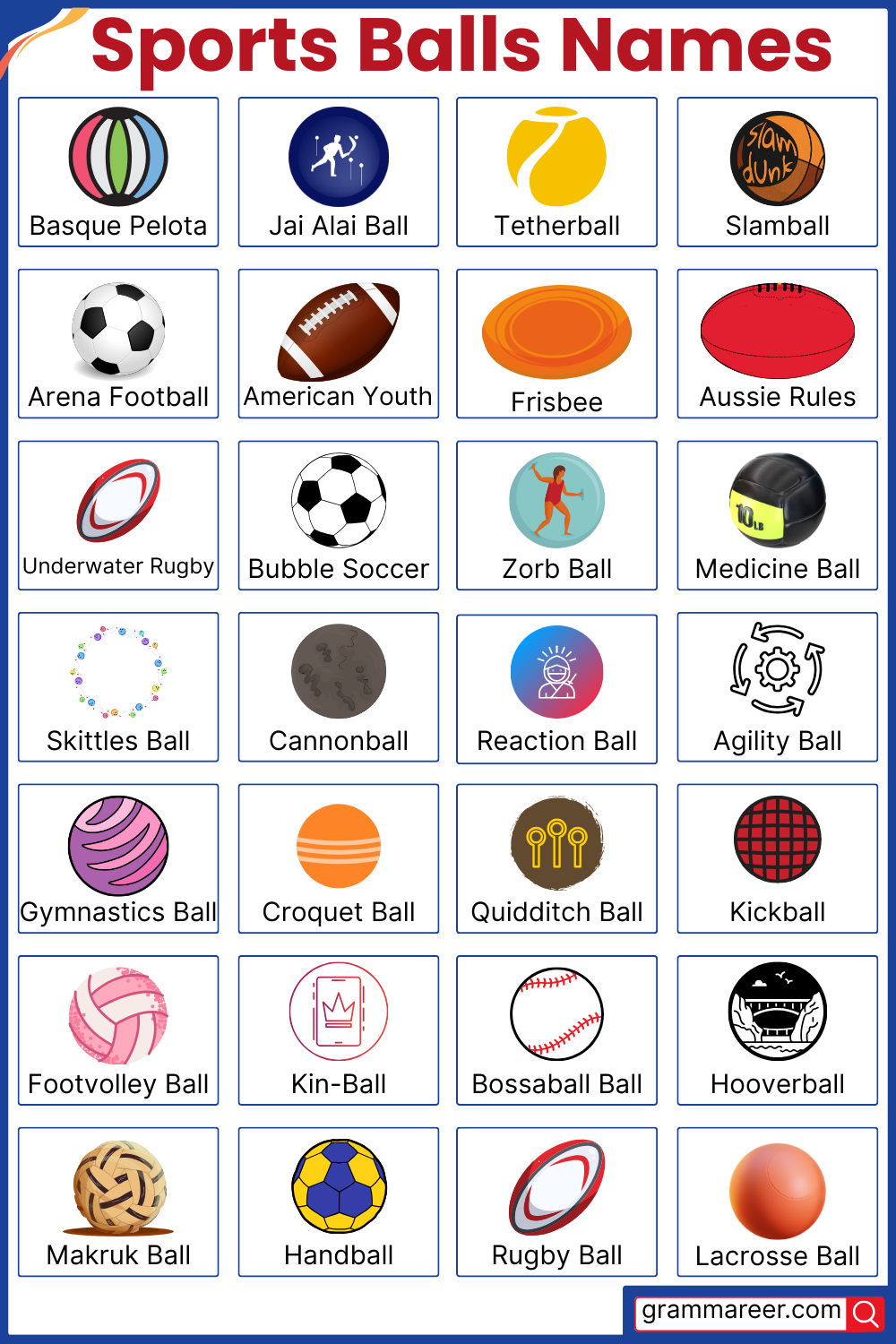
Comparison of 50 Sports Balls Names Used in Different Sports
| Sport | Ball Shape | Ball Size (Diameter) | Weight | Material | Unique Feature |
|---|---|---|---|---|---|
| Soccer | Spherical | 22–23 cm | 410–450 grams | Leather/Synthetic | Standard 32-panel design for aerodynamics |
| Basketball | Spherical | ~24 cm | 600–650 grams | Synthetic/Leather | Pebbled surface for grip |
| Volleyball | Spherical | 21 cm | 260–280 grams | Synthetic Leather | Lightweight for hand strikes |
| Tennis | Spherical | ~6.7 cm | 56.7–58.5 grams | Rubber with Felt Cover | High bounce with visible yellow felt |
| Cricket | Spherical | 22.4 cm (circumference) | 155.9–163 grams | Cork core with leather | Seamed for spin and swing |
| Baseball | Spherical | ~7.3 cm | 142–149 grams | Leather with cork core | Red stitching affects ball flight |
| Softball | Spherical | ~9.7 cm | 177–198 grams | Leather or synthetic | Larger and softer than baseball |
| Rugby | Oval | 28–30 cm (length) | 410–460 grams | Synthetic/Leather | Grippy surface for handling |
| American Football | Prolate Spheroid | ~28 cm (length) | ~400 grams | Leather/Synthetic | Pointed ends for passing |
| Golf | Spherical | ~4.27 cm | ≤45.93 grams | Hard Resin with dimples | Dimples for long flight |
| Table Tennis | Spherical | 4 cm | 2.7 grams | Celluloid/Plastic | Hollow and lightweight |
| Squash | Spherical | 4 cm | 23–25 grams | Rubber | Designed for low bounce |
| Handball | Spherical | 18–20 cm | 425–475 grams | Synthetic/Leather | Grippy surface for palm control |
| Water Polo | Spherical | ~21 cm | 400–450 grams | Waterproof rubber | Non-slip grip in water |
| Netball | Spherical | ~22 cm | 400–450 grams | Rubber or leather | Slightly textured for easy catching |
| Sepak Takraw | Spherical | ~13.5 cm | ~170 grams | Rattan or Synthetic Fiber | Hollow weave structure |
| Bowling | Spherical | 21.5 cm | 2.7–7.3 kg | Plastic/Resin | Finger holes for grip |
| Bocce | Spherical | ~11 cm | 900 grams–1.5 kg | Resin | Dense for rolling on turf |
| Lacrosse | Spherical | 6.7 cm | 140–150 grams | Solid rubber | Hard impact for fast shots |
| Floorball | Spherical | 7.2 cm | 23 grams | Hollow plastic | Lightweight with holes for speed |
FAQs
There are many types of sports balls, each designed for specific sports. Some of the most popular include the soccer ball, basketball, volleyball, tennis ball, and cricket ball. Each ball varies in size, shape, and material to meet the needs of the game.
A soccer ball is round and designed to be kicked, whereas an American football is oval-shaped to facilitate throwing and catching. The materials and internal structures also differ to optimize performance in each sport.
The standard tennis ball has a diameter of around 6.7 cm and weighs approximately 56.7 grams. It’s covered in felt to give it the perfect bounce and reduce air resistance.
The dimples on a golf ball reduce air resistance, allowing the ball to travel further and more accurately when hit. These dimples are a key feature in increasing the ball’s flight distance.
A standard basketball weighs between 600 and 650 grams. Its weight and size are designed for ease of handling, dribbling, and shooting in the game.
A cricket ball is typically red for daylight matches and white for night games. The color and smoothness of the ball influence its visibility and performance in various lighting conditions.
You May Also Like

